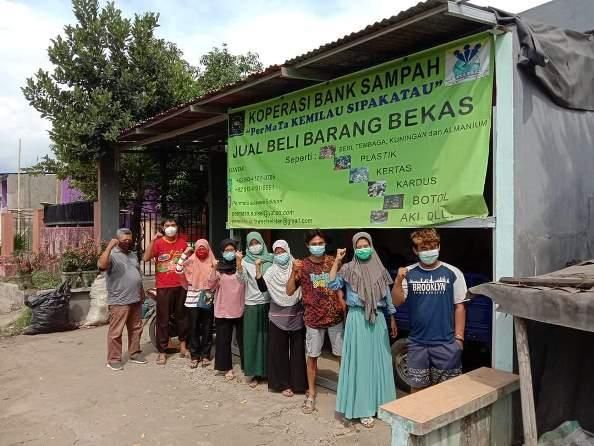Indonesian youth people affected by leprosy set waste bank coop to tackle plastic waste

A group of Indonesian young people affected by leprosy is trying to tackle plastic waste by running a waste bank.
PerMaTa South Sulawesi, an Indonesian association of persons affected by leprosy, set up its Waste Bank Cooperative in the Gowa district of the South Sulawesi province in 2020.
“Our business model is based on the concept of waste banks, which was already practised in several parts of Indonesia, but not in our region,” says the co-op. Its 18 members are young people who, thanks to the cooperative, were able to earn an income for themselves and their families.
They had always had a dream of founding a cooperative to improve their economic situation. Last year that dream came true when they were selected as one of the nine winners of the ICA Youth Replication Project, which gave them access to funding and mentorship from the ICA Youth Network.
“I am proud to be a member of the first cooperative of young people affected by leprosy in Gowa district and I am committed to continuing the cooperation because this is our platform to develop our economic situation as young people affected by leprosy,” says Rahmawati, a young member of the PKS PerMaTa cooperative.
Ahead of setting up their own waste bank, they visited waste banks in Makassar and Gowa where they learnt how to distinguish between the types of waste and weigh it. Within the first five months of operation, the co-op had sold several truckloads of cardboard and paper, iron, plastic, metal and resin products.
The cooperative’s members manage six waste collection points, mostly in the front yard of their family homes in the rural district of Gowa.
In addition to running the waste bank, the cooperative offers savings opportunities for its members, other people who want to become members, and local residents who sell their waste.
Neighbours and people in the area of these collection points collect and drop off their waste at the waste bank branches. In exchange, they can choose to receive cash or have money deposited into a savings account within the co-op. The managers of the collection points then sell the waste to the central waste bank. The pick-up team picks up the garbage with a three-wheel motorcycle twice a week and takes it to the central garbage collection point. Here the waste is pre-sorted, weighed and recorded before being cleaned and sorted into further categories ahead of being sold to different vendors.
The cooperative’s members say that winning the ICA Youth Replication Project has enabled them to earn an income and boosted their confidence – and their families hope to become fully independent.
Existing challenges include promoting waste recycling and raising awareness of their scheme, sorting waste that has already been collected in order to monetise it, and improving members’ management and financial skills.
The cooperative’s total expenditure on purchasing waste and operational costs as well as for waste-sorting wages was Rp 25,251,400 (£1,333). Meanwhile, the total income generated from the sale of waste and from its photocopy business was Idr 33,076,850 (£1,746).
More recently, the cooperative has had to give up its temporary premises and warehouse. The members are looking for a new office space and warehouse to run the waste bank.
“At the moment, we have a savings and loans scheme where some members of the cooperative are active,” they said. “We also strive to increase the capacity of members in terms of administration and various vocational skills that can be turned into small businesses.
“We feel very fortunate that we have been able to build a legally registered PerMaTa cooperative, which we can use to build the economic strength and independence of young people affected by leprosy in Gowa. We learned from our shortcomings with the waste bank which made us stronger and wiser for the future.”
Going forward, they hope to recruit more members to collect more waste, recruit staff outside the cooperative who can bring in additional financial experience and add more waste collection points and business units.
“We express our sincere thanks to ICA for choosing the young members of PerMaTa South Sulawesi / Gowa for your support grant to form a cooperative,“ they added. “This cooperative is not only beneficial for our cooperative members, but also helps the community's economy and environment. It helps realise the Indonesian government's programme towards Going Green. We hope that ICA will continue to collaborate with PerMaTa/YDTI and our cooperative. In addition, we hope that ICA will continue their kind and generous support for other marginalised groups in future.”
